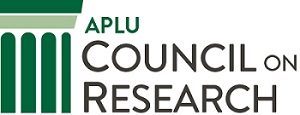
CoR NEWSOctober 19, 2018
To: APLU Council on ResearchFrom: APLU CoR Staff
- APLU Annual Meeting Update and Preliminary Agenda
- Louisiana State University Second Line Parade and House of Blues Reception at APLU Annual Meeting
- Associations Comment on Proposed Changes to NIH Guidelines for Research Involving Recombinant or Synthetic Nucleic Acid Molecules
- NIH Reopens Public Comment Period on Proposed Changes to NIH Guidelines for Research Involving Recombinant or Synthetic Nucleic Acid Molecules
- NIH Seeks Public Comment on Proposed Provisions for Future Draft Data Management and Sharing Policy
- Revision of NSF Award Terms and Conditions
- Last Call for NSF 2026 Idea Machine Applications
- NSF Mid-Scale Research Infrastructure Opportunities
- NSF Seeks Input for Topic Ideas for Emerging Frontiers in Research and Innovation Program
We are so excited to see our 102 CoR registrants at APLU’s 2018 Annual Meeting in just a few short weeks! Our preliminary CoR agenda is available here; it’s not too late to register if you are interested in joining us in New Orleans on November 11-13 for the premier gathering of senior leaders from public research universities, land-grant institutions, and state university systems. For those unable to attend, presentations will be posted on the 2018 CoR Annual Meeting website in near real-time. Please let Sarah Rovito (srovito@aplu.org) know of any questions you may have.
Members of CoR are cordially invited to join the Louisiana State University Office of Research & Economic Development for a second line parade with the Lagniappe Brass Band on Monday, November 12 at 5:30pm. The parade will begin at the Marriott and will conclude with a reception at the House of Blues. We hope that many of you will be able to join us for what surely will be a fun and memorable evening!
- Associations Comment on Proposed Changes to NIH Guidelines for Research Involving Recombinant or Synthetic Nucleic Acid Molecules
On October 10, APLU along with the Association of American Universities (AAU), the Association of American Medical Colleges (AAMC), and the Council on Governmental Relations (COGR) sent a letter to the NIH Office of Science Policy in response to Proposed Changes to the NIH Guidelines for Research Involving Recombinant or Synthetic Nucleic Acid Molecules (NIH Guidelines). The associations expressed appreciation for the agency’s efforts to streamline oversight and eliminate duplicative reporting for Human Gene Transfer (HGT) clinical research and to focus the NIH Guidelines more specifically on biosafety issues.
- NIH Reopens Public Comment Period on Proposed Changes to NIH Guidelines for Research Involving Recombinant or Synthetic Nucleic Acid Molecules
Due to issues with NIH’s electronic comment form, some comments submitted in response to this proposal may not have been received. As a result, the comment period has been re-opened to ensure that NIH receives the maximum amount of feedback from stakeholders. Comments will now be accepted until October 25, 2018 and may be sent to SciencePolicy@od.nih.gov. Those who have previously submitted comments should have received a separate email from NIH verifying receipt of your submission. Questions may be directed to the NIH Office of Science Policy at SciencePolicy@od.nih.gov.
On October 10, NIH issued a Request for Information (RFI) in the NIH Guide to Grants and Contracts to solicit public input on proposed key provisions that could serve as the foundation for a future NIH policy for data management and sharing. The feedback NIH obtains will help to inform the development of a draft NIH policy for data management and sharing, which is expected to be released for an additional public comment period upon its development. Comments on the proposed key provisions will be accepted through December 10, 2018, and can be made electronically here.
To further engage stakeholders, NIH will host a webinar on the proposed key provisions on November 7, 2018 from 11:30am – 1pm ET. Details about the webinar, including how to register can be found here.
For a perspective on the importance of obtaining robust stakeholder feedback on this topic, please see the latest Under the Poliscope by Dr. Carrie D. Wolinetz: A Data Sharing Renaissance: Music to My Ears!
Questions about the proposed provisions may be sent to the NIH Office of Science Policy at SciencePolicy@od.nih.gov.
NSF recently sent the letter below concerning revisions to the agency’s award terms and conditions:
Dear Colleagues:
I wanted to make you aware that the following sets of NSF Award Terms and Conditions have been revised:
- NSF Agency Specific Requirements to the Research Terms and Conditions (ASR);
- Cooperative Agreement Financial & Administrative Terms and Conditions (CA-FATC);
- Cooperative Agreement Modifications and Supplemental Financial and Administrative Terms and Conditions for Major Multi-User Research Facility Projects and Federally Funded Research and Development Centers;
- Grant General Conditions (GC-1); and
- Administration of NSF Conference or Group Travel Award Grant Conditions (FL-26).
Important changes include:
- Revision of the Micro-purchase and Simplified Acquisition Thresholds (Procurement Standards) article to align with Section 806 of the National Defense Authorization Act (NDAA) for 2018, as implemented by Office of Management and Budget (OMB) Memorandum M-18-18, dated June 20, 2018; and
- Implementation of the “Notification Requirements Regarding Sexual Harassment, Other Forms of Harassment, or Sexual Assault” award term and condition.
Each set of terms and conditions is accompanied by a summary of changes made to that document. The revised Terms and Conditions will apply to all new NSF awards and funding amendments to existing NSF awards made on or after October 22, 2018.
If you have any questions regarding these changes, please contact the DIAS Policy Office at policy@nsf.gov.
Regards,
Jean
Jean Feldman
Head, Policy Office
Division of Institution & Award Support (DIAS)
Office of Budget, Finance and Award Management
Email: jfeldman@nsf.gov
Phone: 703.292.8243
The NSF 2026 Idea Machine is a competition to help set the U.S. agenda for fundamental research in science and engineering. Participants can earn prizes and receive public recognition by suggesting the pressing research questions that need to be answered in the coming decade, the next set of “Big Ideas” for future investment by the National Science Foundation (NSF). This is an opportunity for researchers, the public, and other interested stakeholders to contribute to NSF’s mission to support basic research and enable new discoveries that drive the U.S. economy, enhance national security, and advance knowledge to sustain the country’s global leadership in science and engineering. Make sure to enter your “Big Idea” between August 31, 2018 and October 26, 2018; winners (who will receive a cash prize of $26,000 along with recognition) will be announced in August 2019. Please contact NSF2026IM@nsf.gov with any questions.
On October 15, NSF issued a Dear Colleague Letter on Mid-Scale Research Infrastructure Opportunities. Mid-Scale Research Infrastructure (Mid-scale RI) is an NSF-wide Big Idea designed to address the research community’s growing needs for contemporary research infrastructure to support the advancement of science and engineering research and has been identified as critical for scientific advances in many research areas. NSF intends to announce Mid-scale RI funding opportunities this fall; NSF anticipates that one solicitation will include an opportunity to propose Mid-scale RI projects with a total project cost of between approximately $6 million and approximately $20 million, pending the availability of funds. A second solicitation is expected to include an opportunity to propose Mid-scale RI projects with a total project cost of between approximately $20 million and approximately $70 million, pending the availability of funds. Questions regarding Mid-scale RI funding opportunities may be directed to MSRI@nsf.gov.
On September 12, NSF issued a Dear Colleague Letter on Seeking Community Input for Topic Ideas for Emerging Frontiers in Research and Innovation (EFRI) Program. This letter invites the research community to submit suggestions for Topic Ideas to be considered for the FY2020 Emerging Frontiers in Research and Innovation (EFRI) Program Solicitation. Suggestions for EFRI Topic Ideas are currently solicited and vetted every two years. Selected Topic(s) become the focus of research supported by the EFRI Program. Solicitations are announced annually for research proposals that fall under the specified Topic area(s). The deadline for topic idea submission is October 31, 2018; candidate topic ideas, including a 500-word description, may be submitted here. Questions may be directed to Dr. Louise R. Howe or Dr. Sohi Rastegar at efritopicideas2020@nsf.gov.




Stay Connected
X (formerly Twitter)
Facebook
YouTube
LinkedIn
RSS